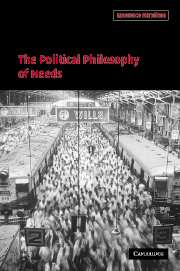2 - The formation and interpretation of needs
Published online by Cambridge University Press: 22 September 2009
Summary
In the previous chapter I developed an understanding of needs based on need forms and categories of human needs that identified the historical, normative, instrumental and thus political nature of needs. My account of vital and agency needs provides a general outline of indispensable human functional conditions and goals (or means, ends, values and ethical objectives) that can be gleaned from the phenomenological material of everyday need satisfaction. It does not make categorical distinctions between needs and wants; rather, it provides the possibility for a more dynamic understanding of their relationship. And it questions the adequacy of the relational formula A needs X in order to Y. As I have argued, this formula is problematic because it engenders an impoverished understanding of needs as means, but it also under-estimates the complexities of how needs are formed and interpreted. For example, the ‘Y’ (or end) in question may be a means mistakenly identified as an end, or a distortion of either means or ends. And these various possibilities concerning the interpretation of ends complicate the evaluation and choice of means to valued ends. Moreover, as I will argue, the nature and form of these ends, in particular the agency needs, can be transformed through time and across space depending upon how their particular manifestations are interpreted and legitimised in everyday experience.
- Type
- Chapter
- Information
- The Political Philosophy of Needs , pp. 63 - 102Publisher: Cambridge University PressPrint publication year: 2003



